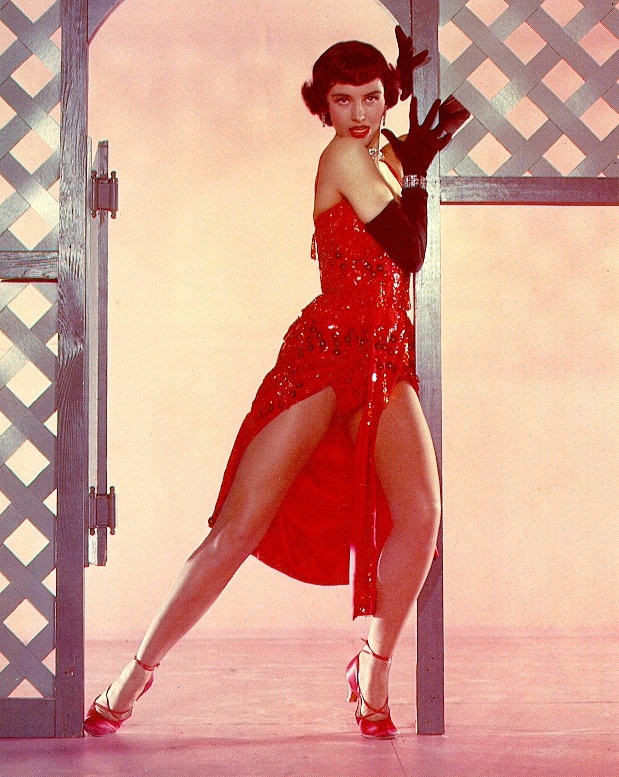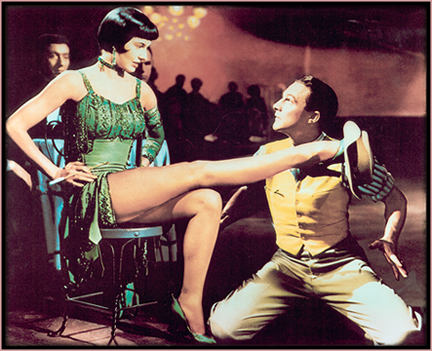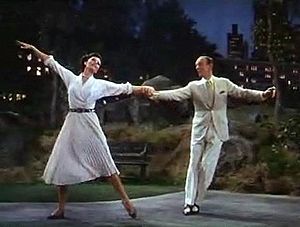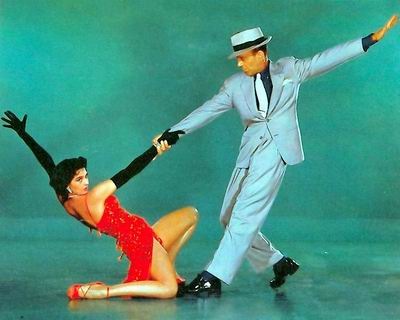Cyd Charisse
(1921-2008)

There will never be another like her
I never believed that Cyd Charisse was real. I never thought that a woman like that could exist. It would be despicable to say that she attracted me sexually. That would have transformed her into a real woman. She dazzled. She was so perfect that she was distant. But wasn't the charm that she exuded over audiences really there? She was five feet seven inches tall without heels. Her figure was long and elegant. A beautiful face, black eyes and, when she was became an established star in Singing in the Rain (1952), her brunette hair was short � la gar�on, like Louise Brooks. Gene Kelly slides across the floor and comes to a halt before an extended leg.

That's already history. It's Cyd's leg. She unfolds it in a giddy pass, stands and begins to dance. That dance consecrated her as a star forever. The following year, Fred Astaire. The movie is Band Wagon.
It isn't possible to describe or qualify or use an adjective, to give neither ten nor thirty-four points to the pas de deux she dances with Fred in the park. Cyd is wearing a loose fitting dress of light material which has the wonderful talent of being able to dance with her. It's not known (according to the movie's plot) if they, Cyd and Fred, will be able to dance together � because she comes from classical ballet and he is a tap dancer. Suddenly they stop, they look at each other, the melody of Dancing in the Dark is heard � and that, precisely that, is the most perfect, precise, sophisticated and beautiful dance number the cinema has ever produced. Astaire, with great generosity, does everything possible
to make her shine. And she is volatile, so feminine, so ethereal, such an exceptional dancer that one� watches, watches what one has seen over the years, because, I must say it, in certain moments of pain, or in others in which my idea of the human condition or of man's journey on earth became dark, fed by a nihilism without return, I have resorted to that dance by Astaire and Charisse and seeing them, watching them dance as they do, I knew that perfection exists, not a minor discovery, and that if the world was not made only for that, it is one of the reasons which justify it. I like to say � somewhat extravagantly � that �one should write like Argerich plays the piano.� I wouldn't dare to say �one must write like Astaire and Charisse dance Dancing in the Dark.� To achieve that, never.����������

Cyd's formation was in Les Ballets Russes and she had the singular talent to apply classical technique to musical comedy without diminishing either one. She never did tap. Eleanor Powell had already done that better than anyone and, in her time, Ann Miller wasn't bad either. In Band Wagon there's a ballet at the end based on a parody of Mickey Spillane's novels. Astaire plays the Mike Hammer type and Cyd a blonde and a brunette. When Astaire enters that iniquitous place in which the city's worst gangsters get drunk and look for fast women, he spots Cyd leaning on the bar. Vincente Minnelli approaches her with the camera. Cyd's mouth is half-open, she looks at Fred with perverse innocence wearing a black cape that covers her up to the neck.���������
And then happens what happens for all eternity: she opens that cape, unbuttons it with decision, lets it fall off her shoulders and emerges in a red dress, long black gloves and � don't let�s forget this � the red dress is short, open for her to show what we all want to see: her legendary legs. It makes no sense to compare them to Marlene Dietrich's. They are two very different personalities. Cyd was above all, I think, an exceptional dancer. Who, furthermore, had exceptional legs. That dance number with Astaire in the cabaret is demoniacal and she makes it so. She is a woman-demon who threatens the man and makes him retreat.�
��

She did other things. A remake of Ninotchka for which everyone expected to tear her apart comparing her to Garbo. Error. Cyd was brilliant as an actress. She offered us a delicious Russian accent and I would even dare to say almost, a wee bit, better than Garbo's. She also made a mediocre film with the boring Dan Dailey, called Meet Me in Las Vegas. But, in this film Cyd serves up a ballet based on the song Frankie and Johnny and what she does is, again, imperishable. After that musical comedies declined. She made a film with Nicholas Ray and some other things which I'll pass over. She did a lot of work in Los Angeles and Las Vegas and, in 1992, made her debut on Broadway with a remake of Grand Hotel. I swear that around 1972 I saw her in a TV film in which she played a mature, failed dancer. You have to look for it: I couldn't close my mouth during the whole picture. She was by then a fine actress. But they denied her that attribute. It doesn't matter. She was unforgettable with what she had. It may be said that today we forget everything, that time is speed, that everything is the present, that the past is erased. It's possible. But that's not a problem for Charisse. She is eternal. And this world, if it doesn't succumb, will one day look again for eternity. She, who was one of its faces, will be there, where she will always be found by those who seek her.������
The article originally appeared, in Spanish, in www.pagina12.com.ar - without the images
Translation: Frank Thomas Smith
